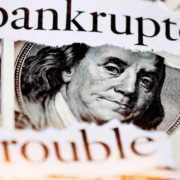Should I Max Out My Credit Cards Before Filing for Bankruptcy in Mississippi?
The thought of filing for bankruptcy can bring a cascade of questions, particularly regarding your financial obligations leading up to the process. One common, yet often misguided, inquiry that arises is whether it’s advisable to “max out” credit cards before declaring bankruptcy. While the idea might seem appealing in a moment of financial desperation, this approach can lead to severe legal consequences and may even jeopardize your ability to obtain a discharge of debts in bankruptcy.
If you are facing bankruptcy in Mississippi, the Gardner Law Group is here to discuss your situation and explain your legal options. Call us today at 228-436-6555 or 228-762-6555 to set up a confidential consultation.
The Core Principle: Honesty and Intent in Bankruptcy
Bankruptcy law is founded on principles of honesty and good faith. When you file for bankruptcy, you are essentially asking the court for a fresh start, a discharge from your debts. The bankruptcy system is designed to help honest debtors who are genuinely overwhelmed by financial hardship, not to provide a loophole for individuals to strategically incur debt they never intend to repay.
Any actions taken shortly before filing for bankruptcy that appear to be an abuse of the system or an attempt to defraud creditors can be met with significant scrutiny by the bankruptcy trustee and the court. This is particularly true for sudden increases in credit card usage.
What Constitutes “Fraudulent” Debt in Bankruptcy?
The U.S. Bankruptcy Code specifically addresses debts incurred through fraud. If a creditor can prove that you incurred a debt with no intention of repaying it, or by making false representations, that specific debt may be deemed non-dischargeable. This means even if your other eligible debts are wiped clean, you could still be on the hook for the fraudulently incurred charges.
Here are key elements that often indicate fraudulent intent in the eyes of the bankruptcy court:
- Timing: Charges made very close to the bankruptcy filing date are highly suspicious. The closer the charges are to your filing, the more likely they are to be scrutinized.
- Nature of Purchases: Debts incurred for luxury goods, services, or cash advances are more likely to be challenged than those for necessities like groceries or medical expenses.
- Sudden Increase in Spending: A significant jump in spending on a credit card that was previously dormant or had a low balance raises a major red flag.
- Inability to Repay at the Time of Purchase: If you knew or should have known that you would be filing for bankruptcy and would not be able to repay the new charges, it could be seen as an intent to defraud.
The “Presumption of Fraud” Rule
Bankruptcy law includes specific provisions that create a “presumption of fraud” for certain types of debts incurred shortly before filing. These presumptions are designed to protect creditors from last-minute abuses of the system.
- Cash Advances: Cash advances totaling more than $1,000 obtained within 70 days before filing for bankruptcy are presumed to be non-dischargeable. This means the burden shifts to you, the debtor, to prove that you intended to repay these cash advances at the time you took them out.
- Luxury Goods and Services: Debts totaling more than $725 for luxury goods or services incurred within 90 days before filing are also presumed to be non-dischargeable. Again, you would need to demonstrate your intent to repay these charges. This specifically excludes purchases for necessary living expenses.
These dollar amounts and timeframes are subject to change, so it is always important to consult with a knowledgeable bankruptcy attorney for the most current figures and legal guidance.
Potential Consequences of Incurring Fraudulent Debt
The repercussions of trying to “max out” credit cards before bankruptcy can be severe and far-reaching:
- Non-Dischargeable Debt: As mentioned, the most immediate consequence is that the fraudulently incurred debt may not be discharged, leaving you still obligated to repay it. This defeats the primary purpose of filing for bankruptcy.
- Creditor Objections: Creditors are vigilant. If they suspect fraud, they can file an “adversary proceeding” within your bankruptcy case. This is essentially a lawsuit within the bankruptcy case where the creditor attempts to prove the debt was fraudulently incurred.
- Increased Legal Fees: Defending an adversary proceeding can be costly, as it requires additional legal work, court appearances, and potentially a trial. These fees can quickly erode any perceived benefit of the pre-bankruptcy spending.
- Denial of Discharge (in extreme cases): While less common for isolated fraudulent debts, a pattern of widespread fraudulent activity, concealment of assets, or failure to cooperate with the trustee can lead to the outright denial of your entire bankruptcy discharge. This would mean all your debts, even legitimate ones, remain your responsibility.
- Criminal Charges (in rare, egregious cases): In extremely rare and severe cases involving significant, intentional fraud against creditors, federal criminal charges could even be considered, though this is highly unusual for individual credit card usage.
What Should You Do Instead of Maxing Out Credit Cards?
If you are considering bankruptcy, the best course of action is to stop using credit cards entirely, or at least severely limit their use, well in advance of filing. Focus on covering your essential living expenses and preserving your assets.
Here are some proactive and advisable steps to take:
- Consult with an Attorney Early: The sooner you speak with a qualified bankruptcy attorney, the better. An attorney can help you understand the appropriate timing for filing, what actions to avoid, and how to prepare your finances.
- Cease Non-Essential Spending: Prioritize your basic needs – housing, food, transportation, and medical care. Avoid any discretionary spending or luxury purchases.
- Gather Financial Documents: Begin collecting all relevant financial records, including credit card statements, loan agreements, pay stubs, tax returns, and records of assets. This preparation will be invaluable for your attorney.
- Understand Your Assets: Your attorney will review your assets and help you understand what property is exempt from creditors under Mississippi and federal bankruptcy laws. Do not attempt to hide assets or transfer them to others, as this is also considered fraud.
- Be Honest and Transparent: Full disclosure with your attorney and the bankruptcy court is paramount. Provide accurate and complete information about your debts, assets, income, and expenses.
Mississippi Bankruptcy Laws: What You Should Know
Mississippi follows federal bankruptcy laws, but it also has its own set of “exemption” laws that determine what property you can keep in a Chapter 7 bankruptcy. While the general principles regarding fraudulent debt apply nationwide, the specific local rules and practices can influence how cases proceed.
For example, Mississippi’s exemption laws may allow you to protect certain assets like your homestead, a portion of personal property, and retirement accounts. A knowledgeable Mississippi bankruptcy attorney understands these specific nuances and can advise you on how they apply to your situation.
Rebuilding Your Finances After Bankruptcy
Bankruptcy is not an end, but a new beginning. While it significantly impacts your credit score in the short term, it also provides an opportunity to reset your financial foundation. Following bankruptcy, it is important to:
- Obtain Your Credit Report: Regularly check your credit reports to ensure that discharged debts are correctly reported and that no errors exist.
- Establish New Credit Responsibly: Consider a secured credit card or a small loan to begin rebuilding your credit history with responsible payments.
- Create a Budget: Develop and stick to a realistic budget to manage your income and expenses effectively.
- Build an Emergency Fund: Start saving a small amount each month for unexpected expenses to avoid relying on credit in the future.
- Continue Financial Education: Take advantage of resources that offer financial literacy education to reinforce good money management habits.
Considering Bankruptcy in Mississippi? Navigate Debt with Integrity
The decision to file for bankruptcy is a serious one with lasting implications. Attempting to manipulate the system by incurring excessive debt just before filing can undermine your efforts and lead to severe penalties. Rather than seeking ways to “game” the system, focus on working within it honestly and transparently. If you are struggling with overwhelming debt and considering bankruptcy in Mississippi, we invite you to contact Gardner Law Group.
Our seasoned legal team is here to offer the compassionate and informed guidance you need to navigate this challenging time successfully. Let us help you understand your options and pursue a path toward financial recovery with integrity.
To discuss your unique circumstances and explore how we can assist you, please call us at 228-436-6555 or 228-762-6555 or fill out our online contact form to schedule a consultation.
Gardner Law Group
Biloxi Office
178 Main Street,
Biloxi, MS, 39530
P: (228) 900-9618
Pascagoula Office
3012 Canty Street,
Pascagoula, MS, 39567
P: (228) 231-3855







